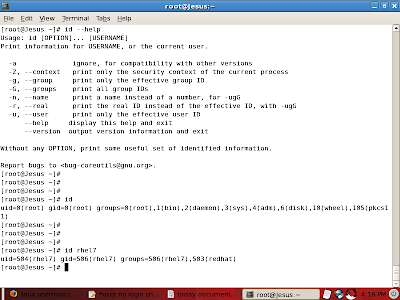In the Linux Operating system.All the users and Groups identify by separate unique Numerical Id.Linux Operating system root userid and group id as 0.user id group id zero 0 refer to unlimited access Full permission to the system.and if add any other user there userid and group id start from the 500.
[root@sourcecode~]# tail -n 6 /etc/passwd
opensource:x:500:500:opensource:/home/opensource:/bin/bash
user1:x:501:501::/home/user1:/bin/bash
rhel6:x:503:505::/home/rhel6:/bin/bash
rhel7:x:504:506::/home/rhel7:/sbin/nologin
rhel55:x:502:504:version5:/home/rhel5:/bin/bash
bash:x:505:507::/home/bash:/bin/bash
And we can identify the users id separately.
By the following command

[root@sourcecode~]# id username
[root@sourcecode~]# id rhel7
uid=504(rhel7) gid=506(rhel7) groups=506(rhel7),503(redhat)
[root@sourcecode~]# id root
uid=0(root) gid=0(root) groups=0(root),1(bin),2(daemon),3(sys),4(adm),6(disk),10(wheel),105(pkcs11)
Default User Id and Group Id
0 refer to the root id or Super User Id
1 to 499 refers to the Network userid
500 to 6500 refers to Normal user id
[root@sourcecode~]# tail -n 6 /etc/passwd
opensource:x:500:500:opensource:/home/opensource:/bin/bash
user1:x:501:501::/home/user1:/bin/bash
rhel6:x:503:505::/home/rhel6:/bin/bash
rhel7:x:504:506::/home/rhel7:/sbin/nologin
rhel55:x:502:504:version5:/home/rhel5:/bin/bash
bash:x:505:507::/home/bash:/bin/bash
And we can identify the users id separately.
By the following command

[root@sourcecode~]# id username
[root@sourcecode~]# id rhel5
uid=502(rhel5) gid=504(rhel5) groups=504(rhel5),503(redhat)
[root@sourcecode~]# id rhel7
uid=504(rhel7) gid=506(rhel7) groups=506(rhel7),503(redhat)
[root@sourcecode~]# id root
uid=0(root) gid=0(root) groups=0(root),1(bin),2(daemon),3(sys),4(adm),6(disk),10(wheel),105(pkcs11)
Default User Id and Group Id
0 refer to the root id or Super User Id
1 to 499 refers to the Network userid
500 to 6500 refers to Normal user id






0 Comments